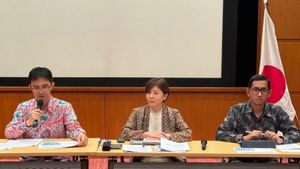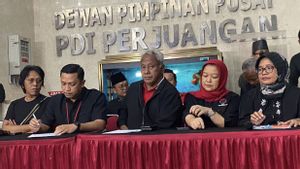JAKARTA - The Center of Economic and Law Studies (Celios) revealed that the plan to increase Value Added Tax (VAT) from 11 percent to 12 percent as of January 1, 2025, became a hot discussion in various circles.
BELIOS Legal Director Mhd Zakil Fikri said the government lightly took refuge in the narrative that the increase was an order from the law, so the ambition to increase VAT rates continues to be pursued.
According to Zakiul, the order referred to is precisely contained in Chapter IV concerning Tax on Added Values of Article 4 Number 2 of Law 7 of 2021 concerning Harmonization of Tax Regulations (UU HPP).
Meanwhile, the provisions of Article 7 paragraph (1) of Article IV Article 4 Number 2 of the 2021 HPP Law stipulate that the VAT rate of 12 percent will take effect no later than January 1, 2025.
Zakiul conveyed that regarding this norm, there are two things that need to be noted, namely first, the purpose of legal norms is made not only for the sake of legal certainty, but must also contain benefits, propriety and legal justice.
Second, the provisions regarding tax collection should represent the interests of the people or the public, in line with the principle of no tax without representation.
"When the data shows that the increase in VAT has an impact on the economic crisis for the community and bring people to poverty, it means that materially the statutory norms that order the increase in VAT do not contain legal propriety and justice," he explained in an official statement, Tuesday, December 24.
According to Zakiul, if the norm of the problem is forced to apply, it causes legal problems or even legal chaos.
According to Zakiul, the Government could evaluate the increase in VAT by lowering it to 5 percent or increasing it to a maximum of 15 percent, according to the provisions of Article 7 paragraph (3).
"However, reducing the VAT rate or delaying the implementation of the VAT increase is impossible, because they focus on carrying out orders from Article 7 paragraph (1), the pretext that continues to be published in various media," he added.
Zakiul said that although the option of Article 7 paragraph (3) to be implemented, legal chaos will still occur due to the ambiguous and unclear rules regarding barometers to determine 5 percent to 15 percent.
In addition, the implementation of the norms of Article 7 paragraph (3) must be carried out together with the House of Representatives of the Republic of Indonesia (DPR RI) in accordance with the provisions of Article 7 paragraph (4). As a result, it takes a long, long, and complicated process.
VOIR éGALEMENT:
Therefore, Zakiul conveyed that under the order of Article 7 paragraph (1) Chapter IV Article 4 Number 2 of the 2021 HPP Law, the government must annull it through a Government Regulation in Lieu of Law (Perppu).
The existence of a Perppu in the politics of Indonesian regulations for the last 10 years is not a rare thing. During the previous President's administration, 8 types of Perppu for different urgent reasons had been issued.
"Among the Perppu in question, namely Perppu No. 1 of 2015 concerning TIPIKOR, Perppu No. 1 of 2016 concerning Child Protection, Perppu No. 1 of 2017 concerning Tax Interests, Perppu No. 2 of 2017 concerning Ormas, Perppu No. 1 of 2020 concerning State Financial Policy at the Time of the Pandemic, Perppu No. 2 of 2020 concerning Pilkada, Perppu No. 1 of 2022 concerning Elections, and Perppu No. 2 of 2022 concerning Job Creation," he said.
The English, Chinese, Japanese, Arabic, and French versions are automatically generated by the AI. So there may still be inaccuracies in translating, please always see Indonesian as our main language. (system supported by DigitalSiber.id)












